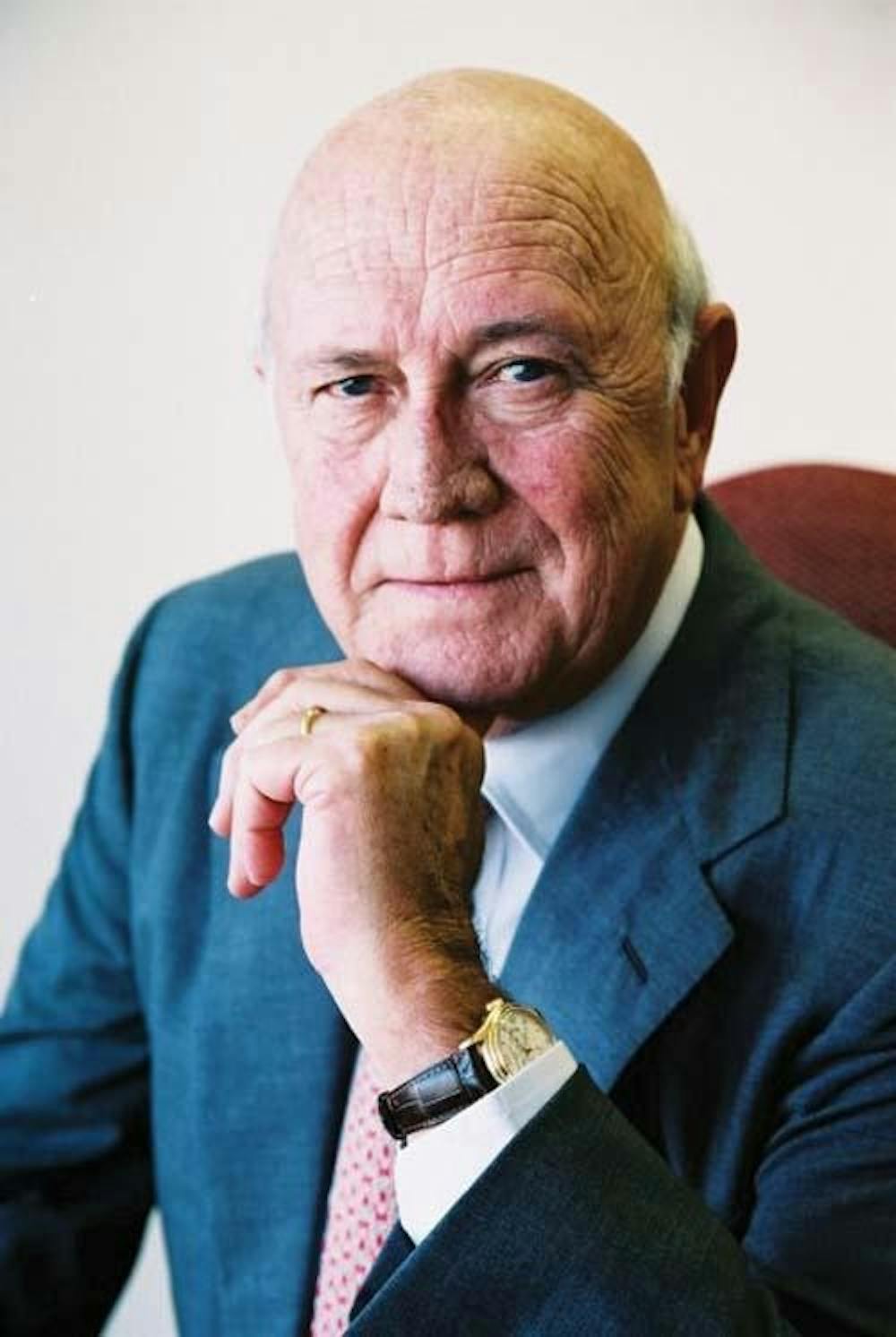Former South African President F.W. de Klerk to speak at UP this Wednesday
F.W. de Klerk (Photo courtesy of F.W. de Klerk Foundation)
By Natalie Wheeler, Staff Writer -- wheelern12@up.edu
The man scheduled to speak at UP on Feb. 29 shares a Nobel Peace Prize with Nelson Mandela. He is credited with freeing Mandela from prison, helping end South Africa's apartheid and voluntarily eliminating South Africa's nuclear weapons.
He is also accused of leading a government charged with numerous human rights abuses.
Former (1989-1984) South African President F.W. de Klerk will join local university presidents in a panel discussion about solutions for the dispute between North and South Korea as well as the Israeli-Palestinian conflict. De Klerk's visit – his first public appearance in over a year – was organized by the Wholistic Peace Institute (WHI), a local nonprofit that works to bring Nobel Peace Laureates to Portland.
Some critics of de Klerk, who argue he is not a good icon for peace, are unhappy with de Klerk's Portland appearances, which also include events at the First Congregational Church and Downtown Hilton Hotel.
In an email to board members on Feb. 18, WHI founder Gary Spanovich said he received emails disagreeing with de Klerk's visit to Portland and as a result warned the board to be prepared for protesters at de Klerk's Portland appearances.
Portland police, Public Safety and de Klerk's security team are working together to ensure the safety of de Klerk during his UP appearance. In reference to protest fears over de Klerk's visit, Harold Burke-Sivers, director of Public Safety, said he was "monitoring the activity," but declined to comment on specifics.
Fr. Claude Pomerleau, professor of political science and WHI board member, said he is not overly concerned about protesters coming to UP because they are more likely to show up at de Klerk's downtown Portland event.
Pomerleau defended WHI's decision to invite de Klerk to Portland, seeing it as an opportunity to learn from a political leader who successfully transitioned his country into a democratic state.
"He was the head of state so he, of course, has some responsibility for the atrocities of his government," Pomerleau said. "Of course I have my disagreements, but you need to have some sort of dialogue in order to promote peace. He was also able to transition his country out of apartheid."
Alan Wieder, who is writing a book about two anti-apartheid activists in South Africa, was one Portland resident who contacted Spanovich to voice his dissent. Wieder said it felt wrong to put de Klerk on the same pedestal as Desmond Tutu and the Dalai Lama – two former featured speakers for WHI.
"My biggest issue is that de Klerk was either involved in mass murders (during his time as president) or at the very least turned a blind eye to it," Wieder said.
However, senior Claire Hendrix, who is an intern at WHI, said the Institute's aim is to bring Nobel Laureates to Portland, despite their controversies.
"I guess realistically you're never going to find someone that no one will find any harm in," Hendrix said. "Really, I think it's important for us to be exposed to the discussion de Klerk brings to the table, plus it brings some recognition to the school."
In addition to his government's human rights violations, another major controversy over de Klerk stems from an investigation by South Africa's Truth and Reconciliation Commission, a court created to bring justice to apartheid-era human rights abuses. In 1998, the Commission found evidence of de Klerk's connection to some 1980s bombings of anti-apartheid offices.
The Commission never included accusations of de Klerk in its final report, wishing to avoid delay of the report's release after a court challenge by de Klerk – a move that Commission chairman Bishop Desmond Tutu, who visited UP in 2009, strongly disagreed with.
"It upsets me deeply," Tutu said in a BBC interview at that time. "We have been scrupulously fair to Mr. de Klerk and we reject the contention that we have been engaged in a vendetta against him."
Although his decisions during his political career have been divisive, in 2004 de Klerk founded the Global Leadership Forum, a league of former heads of state that provides discreet assistance and advice for burgeoning democratic countries.
Beyond the controversy, Pomerleau hopes de Klerk's presence on the Feb. 29 panel inspires a thoughtful discourse on peace.
"It's difficult, but what we want to do is create the structures for the planet that are going to allow solutions to problems that go beyond fighting in war," Pomerleau said. "It doesn't mean they'll be better, doesn't mean they'll be quicker. It means they'll be more human."








